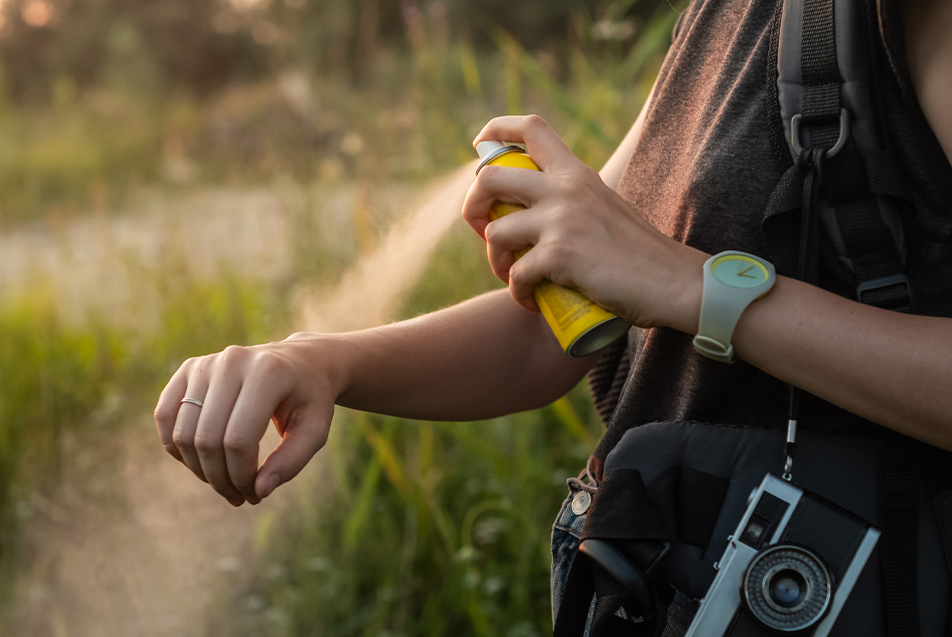
This time of year is perfect for outdoor activities like hiking, camping, fishing and exploring. It’s also the season of bugs. Nicholas Seman, DO, PPG – Family Medicine, provides important details about which bug spray to pick to prevent unwanted bites, how to apply and why it’s so important in the warmer months.
In what situations and/or environments should we apply bug spray?
Bug spray should be applied if you are in an outdoor setting where you may be exposed to a biting insect that has a chance of disease transmission.
Are there certain varieties of bug spray you recommend?
Typically, if you are going to be exposed to a higher concentration of biting insects, then it’s best to use a product containing between 10-35% DEET. Concentrations of DEET higher than this should be reserved for situations in which insect infestation is high, the repellent may be partially washed off, or time outdoors will exceed three to four hours.
If possible, microencapsulated formulations are preferred as these will offer protection for a longer period of time with lower concentrations of active repellant. Alternatively, 20% picaridin is a reasonable alternative for people wishing to avoid the unpleasant characteristics of DEET and are willing to accept a somewhat shorter-acting repellant.
Other repellants have been studied but the findings are inconsistent, which is why the current recommendations are DEET or picaridin. Permethrin applied to clothing has been used as well and is still relatively useful, but resistances are developing. Permethrin-treated clothing and DEET repellent used in combination when in highly concentrated areas of biting insects appears to offer the best protection overall.
Are any of the ingredients in bug spray potentially harmful to our health?
Picaridin has an excellent tolerability profile. It is odorless, nonstick and nongreasy. It does not irritate skin, stain fabrics or degrade plastics. DEET on the other hand has a small chance of causing skin irritation, allergic reactions and, very rarely, neurotoxicity. DEET is not a cancer-causing agent, but it can damage some plastics as well as clothes made from synthetic fibers, such as spandex or rayon.
How often should people apply bug spray?
If you sweat heavily, swim or get water on the treated areas, it is not a bad idea to reapply. Otherwise, one application of DEET should be enough to get coverage for three to four hours, and picaridin should provide one to two hours of protection against ticks and three to four hours against mosquitos.
Are there different considerations based on age?
DEET should not be used on any individuals under the age of 2 months. Pregnant women can use repellents safely just as any non-pregnant individual would.
How should people apply bug spray?
Avoid spraying DEET directly onto the face. Spray first into the hands and then apply to the face, avoiding the eyes and mouth. For kids, avoid applying spray to the hands or fingers, as they commonly have their fingers around their eyes or in their mouths. Also avoid spraying DEET under clothing. Do not apply DEET to any open sores, cuts or skin abrasions. Only use as much repellant as necessary.
Why is it important to use bug spray?
Insects are vectors for carrying many different types of illnesses. These can be fairly benign to something severe like West Nile or Zika virus, among many other illnesses that can result in severe complications. Tick borne illnesses are also a major concern, especially as we see Lyme disease continue to become more common in our area within our tick population.
If you are going to be exposed to any biting insects, consider wearing protective clothing and using bug repellent to prevent bites. If you find a tick imbedded in your skin, remove this carefully and dispose of the insect and contact your healthcare provider as soon as possible. Please also contact your healthcare provider with any additional questions or concerns and they will be happy to assist you.




